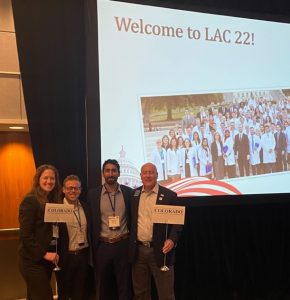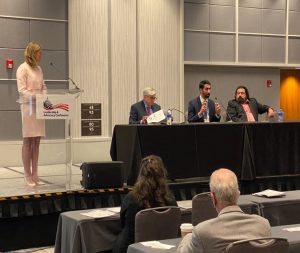
(From left to right) Drs. Rebecca Kornas, Evan Gerber, Jasmeet Dhaliwal and Vidor Freedman at ACEP LAC 2022
Jasmeet Dhaliwal, MD, MPH, MBA
Director, CO ACEP Board of Directors
ACEP’s annual Leadership and Advocacy Conference (LAC) was held again in Washington, DC from May 1-4. Emergency physicians from across the country gathered to learn about pressing policy issues and advocate directly with our federal legislators. Our Colorado delegation included EM physicians from the front range and mountain communities. The conference started with a Health Policy Primer focused on the importance of regulatory advocacy. It turns out the passage of a bill into law by Congress is only the start of a long implementation process. Rulemaking by federal agencies is complicated, but also creates opportunities for stakeholders to influence the real-world impact of important legislation. The overall message was that we, emergency physicians, should be just as involved in regulatory advocacy as we are in legislative advocacy.
Day 2 of LAC was jam packed with opportunities to learn about advocacy efforts within our specialty and about important policy issues relevant to emergency medicine. Dr. Lotte Dyrbye (now faculty at University of Colorado) discussed physician burnout and highlighted how emergency medicine has some work to do as a specialty to improve longevity in clinical practice. She emphasized that burnout has real world impacts on the quality and safety of patient care. She also highlighted how productivity-based pay is a significant risk factor for burnout. Dr. James Phillips spoke about workplace violence in the emergency department, noting that many of us have accepted violence as part of the job. He emphasized that we need to push back on this issue, especially from the policy perspective. There is some good news on that front. Colorado recently passed an “anti-doxing” law (HB-1041) that bans revealing private or identifying information about health care workers on the internet. Of note, the bill was sponsored by Rep. Dr. Yadira Caraveo in the Colorado House. At the federal level, the Workplace Violence Prevention for Health Care and Social Service Workers Act (HB-1195) has been introduced in the House and will soon be introduced in the Senate. It aims to mandate that OSHA establish a standard that requires health care facilities develop and implement prevention plans to reduce workplace violence. The morning session was capped off with a round table discussion of scope of practice legislation that has been debated in multiple states. Colorado ACEP shared its experience successfully opposing scope of practice legislation during our state’s most recent legislative session. The discussion centered around the need for alternative strategies to address rural access to care while preserving the physician-led teams that are essential for high value care. The afternoon session featured discussions of consolidation in health care markets, an address by Admiral Rachel L. Levine, MD (current Public Health Service Assistant Secretary for Health at HHS), and a discussion of the Lorna Breen Health Care Provider Protection Act by original bill sponsor Sen. Tim Kaine (D-VA).

ACEP President Dr. Gillian Schmitz moderated the panel Nope to Scope expansion. Dr. J Dhaliwal (center) presented the Colorado experience with the PA scope expansion bill.
The final day of LAC was centered around direct advocacy with legislators. The Colorado delegation met with staff from the offices of Sen. Bennet, Sen. Hickenlooper, Rep. DeGette, Rep. Crow, and Rep. Neguse. We asked for support of three legislative efforts that have a direct impact on our specialty. The ER Hero and Patient Safety Act was first introduced by in 2020 by Sen. Roger Marshall, MD (R-KS) and Rep. Raul Ruiz, MD (D-CA). It would ensure, through HHS rulemaking, that due process rights are protected for all emergency physicians, regardless of who employs them. The Workplace Violence Prevention for Health Care and Social Service Workers Act (HB-1195) was the second bill we discussed. As mentioned above, it would require OSHA to establish enforceable workplace violence prevention standards in hospitals. Lastly, our Colorado delegation asked for support in identifying short and long-term solutions to the yearly threat of wholescale cuts to the Medicare Physician Fee Schedule (PFS) caused by budget sequestration, CMS budget neutrality requirements, and so-called PAYGO budget control requirements triggered by the cost of the American Rescue Plan Act of 2021. These cuts are compounded by the lack of inflationary adjustment in the PFS over the past 20 years that has resulted in a 50% effective decline in Medicare physician reimbursement over that time. Many thought that 2015’s MACRA legislation would permanently fix issues with the PFS (remember the good ole days of the SGR?). Sadly, the alternate payment models and quality reporting incentives outlined in MACRA have not been implemented in a way that allows emergency physicians to fully participate.
As is the case every year, LAC was an incredible opportunity to interact with ACEP leaders, learn the essentials of advocacy, and promote legislation that benefits emergency physicians and our patients. It was energizing to meet physicians from across the country who are working hard to support our specialty. Their collective work highlights how important it is that all emergency physicians commit time and/or money to advocacy efforts.
